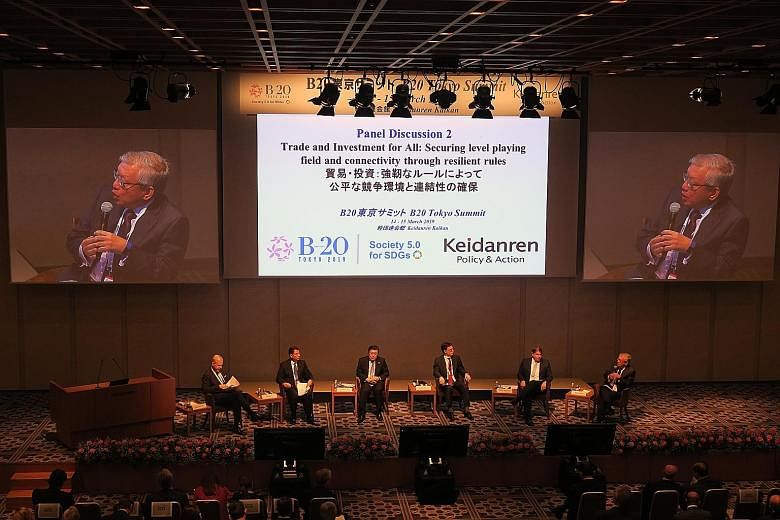The Achilles' heel of nascent technologies such as 5G, artificial intelligence and big data, which have the potential to boost productivity and resolve social issues from eldercare to climate change, is the lack of a common global standard on data protection, a business forum heard yesterday.
Yet another weakness is the poor digital literacy among some quarters of the world, which means a segment of the global population could miss out on the benefits of the digital economy.
Business leaders from the Group of 20 (G-20) bloc of the world's largest developed and developing economies noted that the surge in protectionist sentiment worldwide should serve as a cautionary tale of the need for inclusive growth. They were speaking at the Business 20 or B-20 summit organised by the influential Keidanren business lobby.
In a list of policy recommendations that Keidanren chief Hiroaki Nakanishi handed to Japanese Prime Minister Shinzo Abe at the close of the forum, world leaders were urged to take up digital transformation as a key agenda topic at the G-20 Leaders' Summit in Osaka in June.
Other key issues include climate change, gender equality, quality infrastructure, and protecting free trade and investment systems.
Mr Nakanishi and panellists such as World Trade Organisation deputy director-general Yi Xiaozhun, said global headwinds, including the looming Brexit and ongoing United States-China trade frictions, have affected business sentiment, making it crucial to safeguard multilateral systems.
"Nothing is more urgent than restoring global cooperation and liberalisation," Mr Yi said. "Fundamentally, progress depends on everyone acknowledging that world trade has never been so interconnected and no country, however powerful, can resolve its trade challenges on its own."
Singapore, while not a G-20 country, has regularly had a seat at the table. Yesterday, Singapore Business Federation chief Ho Meng Kit said Asean has greatly gained from open trade systems and will benefit from a set of rules that can facilitate the digital economy now that the region is home to unicorn start-ups valued at over US$1 billion (S$1.35 billion), such as Grab and Gojek.
Mr Brooks Entwistle, chief international business officer at Uber, and Mr Eric Jing, chief executive of Ant Financial Services Group that operates China's largest mobile payment platform Alipay, both lauded the digital transformation for driving financial inclusion at unprecedented speeds, given the opportunities for mom-and-pop businesses.
Japanese telecommunications giant NTT chairman Hiromichi Shinohara said there could be more effective sharing of data worldwide to drive innovation and to build a multilateral cyber security framework.
"Now, countries have different rules and regulations in data distribution and the protection of personal privacy," he said. "This is not entirely wrong, but to maximise the effective use of data, some harmonisation is necessary across borders."
Climate change also emerged as a key issue. International Chamber of Commerce chairman Paul Polman criticised Japan for failing to adequately do its part given its reliance on coal-fired plants.
He called for more political will among countries that still rely on coal to adopt renewable alternatives, so as to avoid "committing the biggest inter-generational crime in the history of mankind".
Mr Abe, in brief remarks yesterday, said the G-20 will work towards "a future-oriented growth strategy" that can leverage disruptive technology to overcome global challenges like climate change and growing income disparities. But he was challenged to walk the talk.
Mr Perrin Beatty, president of the Canadian Chamber of Commerce, said: "It is a truism that when leaders get together, that when all is said and done, more is always said than done.
"The real challenge will be for leaders to go beyond making a statement at the lowest common denominator that everyone can live with, to actually make firm, genuine commitments."
Key proposals by G-20 business leaders
TOKYO • Business leaders from the Group of 20 (G-20), comprising the world's largest developed and developing economies, yesterday submitted to Japanese Prime Minister Shinzo Abe a list of policy recommendations they want him to raise at the G-20 Leaders' Summit in Osaka in June.
These are some key proposals:
DIGITAL TRANSFORMATION
• Build a common data governance framework to safeguard the free flow of data, information, ideas and knowledge, while also respecting privacy and intellectual property.
• Promote a coordinated global response to cyber security threats.
• Increase digital literacy by ensuring digital education is made affordable and accessible to all, including the poor and the elderly.
TRADE AND INVESTMENT
• Reform the World Trade Organisation, to improve its dispute settlement, rule-making and monitoring functions.
• Ensure free trade agreements are comprehensive and of high standard, without pre-emptive clauses and quantitative restrictions that are not in line with global norms.
ENERGY AND ENVIRONMENT
• Keep climate change high on the political agenda, to realise a very low-emission society.
• Tackle marine plastic waste and ban illegal waste disposal.
QUALITY INFRASTRUCTURE
• Promote projects that are open, fiscally sound and environmentally sustainable, and ensure job creation and transfer of technology.
HEALTH AND WELL-BEING
• Improve efficiency by digitising health data which, when aggregated, can support innovation in new medicines and vaccine developments, as well as help produce better diagnosis and treatment.
Walter Sim


